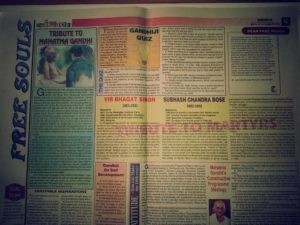GLIMPSE INTO JOURNALISM
Writing for the media and how to write like a pro for newspapers, magazines, radio, television, advertising, theatre, cinema and now Internet, is a field which requires various Skills for a tough and challenging exposure. The world is at your beat if you possess the five D’s –Devotion, Determination, Dedication, Decision and Discrimination, there is nothing on the earth that one cannot do – Just add a bit of Love and Faith – Miracles happen. Proficiency in language skills, clarity of thought, good general knowledge, awareness, understanding and a pleasing personality sees you through in journalism. An excellent academic degree with additional postgraduate diplomas or specialization skills like MBA, CA, Computers and Engineer are in great demand for specialized reporting. However, today with the latest technology advancement, anyone with Awareness and proficient language skills can opt to become a writer Online on the Internet and contribute in Newsletter and earn credits & a living too.
Napoleon described a journalist as “a grumbler, a censor, a giver of advice… a tutor of nations,” and added that four hostile newspapers are more to be feared than a thousand bayonets. True, and more true in these days of moral corrosion in public life. Against this background, a journalist acquires great significance; he can make or break, destroy and mould. A writer can expose, review, inform, entertain, teach, preach or just about perform his role in writing media with clarity, power and impact. News, comments and entertainment are the axis on which the media world revolves. While newspapers and magazines by and large cater to the serious minded who are seeking in-depth reports and analyses or information or a bit of entertainment and education here or there, television and radio is for the fun loving. Nevertheless, the power of the electronic media to capture and bring live what is happening around the world into your drawing room, is simply matchless. If the electronic media is the first with news, the print media is the best with news – giving a wealth of insight, detail and perspective. The print media is unbeatable with range of coverage, local as well as global with additional inputs on entertainment, education, political, science, sports etc.
Journalism, in fact, is now a lot more exciting than it was during the early years of India’s Independence. The role that journalists have played as watchdogs of current affairs in recent years has given the profession itself a halo and a unique appeal of its own. Journalists today are both a feared and a respected lot. Television has in no way diminished the role of the press as the extended eyes and ears of the public.
An increasing number of graduates are opting for journalism as a first choice, a tough and challenging career, and while journalists may not earn as much or enjoy as many perks as an MBA, the excitement that their relationship with the public provides is tremendous. As watchdogs of the nation they are able to participate in the promotion of social welfare and development. That is a reward even the heftiest compensation package cannot match. No doubt many journalists have been accused of corruption and irresponsibility but the enormous public awareness they have generated and their role in shaping public sensitivity cannot be overlooked. Thousands of events happen everyday, which can neither be found in print media or can be viewed on television or surfed on net. Television viewing and Net surfing demands a lot of time, money and energy but for a mass community, print media is a sure fire way towards keeping oneself informed, aware, entertained, educated!
Towards Journalism, Free souls make an effort for overall positions in print media and one can check out for an Institute that offers a Journalism course.
The Chief Editor: The general and supreme commander of the Newspaper, responsible for every area of the editorial function. Inborn leadership qualities, high professional stature and a reputation within and without the office are qualities of an Editor.
The Resident Editor: The Resident Editor is chosen from amongst Assistant Editors, News Editor or Chief of Bureau. Some Newspapers have separate editions in different cities and Resident Editor captains each edition.
The Managing Editor: He is more managerial than editorial and is concerned with pricing and economics of the Newspaper.
The Executive Editor: The Executive Editor has a wider command area and is responsible for all editions of a newspaper. His principal job is monitoring and coordinating the working of different newspapers. His main conern lies in the news, not views or comments.
The Chief Sub Editor: He gives an attractive appearance to the printed matter and considers the interest value of the news item.
The Assistant Editor: He is often in charge of a particular section of the paper
The News Editor: Editing is adding sparkle to a dull text. He plans the actual layout of the paper and works closely with the advertisement department
Reporter : Reporting for a newspaper can be exciting. Its basic function is to report which involves collection of Information by interviewing people or compile news on health, crime, civic matters, education, politics, etc. It takes a reporter right where the news is – from a Prime Minister or Chief Minister’s office to five star hotel to airports to crowded bus terminals or just about anywhere where one can meet all kinds of people, interview celebrities, etc. Getting a byline (article coverage with name) on front page or special position for a reporter means a credit for him.
Special Correspondent: After acquiring experience and proficiency in several beats, the reporter is promoted as Chief Reporter or a Special Correspondent who are specialized reporters in their fields and cover Politics, economics, defence, banking, commerce, external affairs, etc. Freedom differs based on experience and seniority.
The Feature Writer: The feature writer works in close touch with a specific department to cover news on a specific area, eg: education, lifestyle, etc. He often specializes in a particular field
The News Columnist: He writes under his own name and his observations are those of a specialist, a close observer and an analyst.
The Cartoonist: He makes comical or satirical sketches of political or cultural events.
The Artist: He draws sketches to illustrate incidents.
The Photographer: He provides relevant photographs for news items
The Commentator: He reports and analyses the news and gives his comments on it.
The Foreign Correspondent: He sends news reports from abroad. There are Indians working at home for foreign agencies such as Reuters or for foreign radio companies like the BBC and the VOA.
The Freelance Journalist: A freelance journalist has great scope today for exposure. The Freelancers either get paid per piece, sometimes at a per word rate or sometimes get only Exposures and experience which helps to get them ‘Bylines’ (articles printed in their name) which make them writers by choice. He/She can also receive additional honorariums for other contributions. Not only in print media but Online opportunities for such Freelancers are galore which makes them earn while they write and expose their writings with their articles in Newsletters. A Freelancer writer is now more in demand to write themes for websites by the Web Designers and these themes vary from Newsletters to Business, management, reviews, entertainment, technology, etc.









